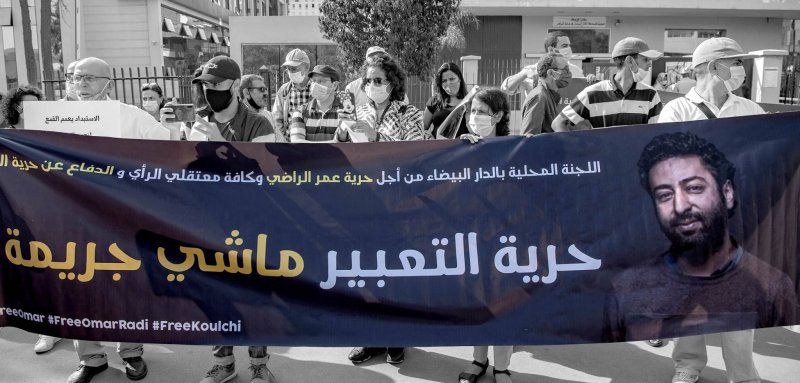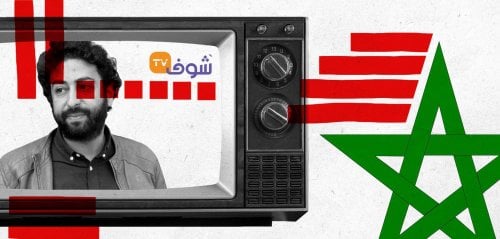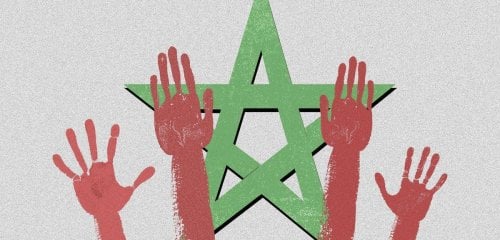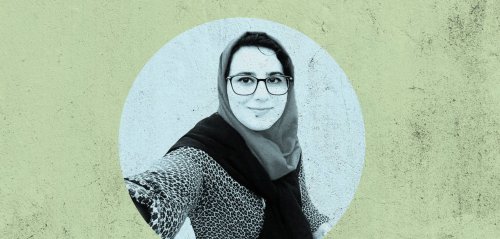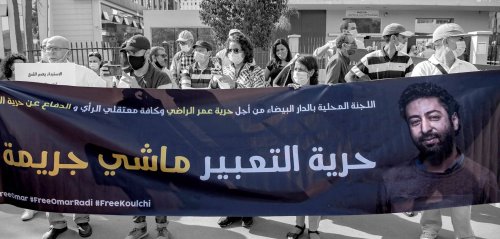"2020: Morocco without prisoners of conscience". This phrase was more than just ink on paper. The cry for hope was launched by Moroccan activists, politicians and journalists at the beginning of last year, expressing their rejection of the continued pursuit of those criticizing the country’s authority, and their willingness to work together to end political arrests in the country.
On January 11, 2020, hundreds of human rights activists signed a document calling for the release of prisoners of conscience and an end to political detention, in line with a document leaders of the Moroccan nationalist movement presented to France on the same day in 1944 calling for the independence of Morocco.
The writers of this document drafted it in the same format the country’s declaration of independence was issued in 76 years ago, in turn, reflecting the hope of those standing behind this new document declaring a "Morocco without prisoners of conscience" - just as the declaration of independence came following the "January 11th" document.
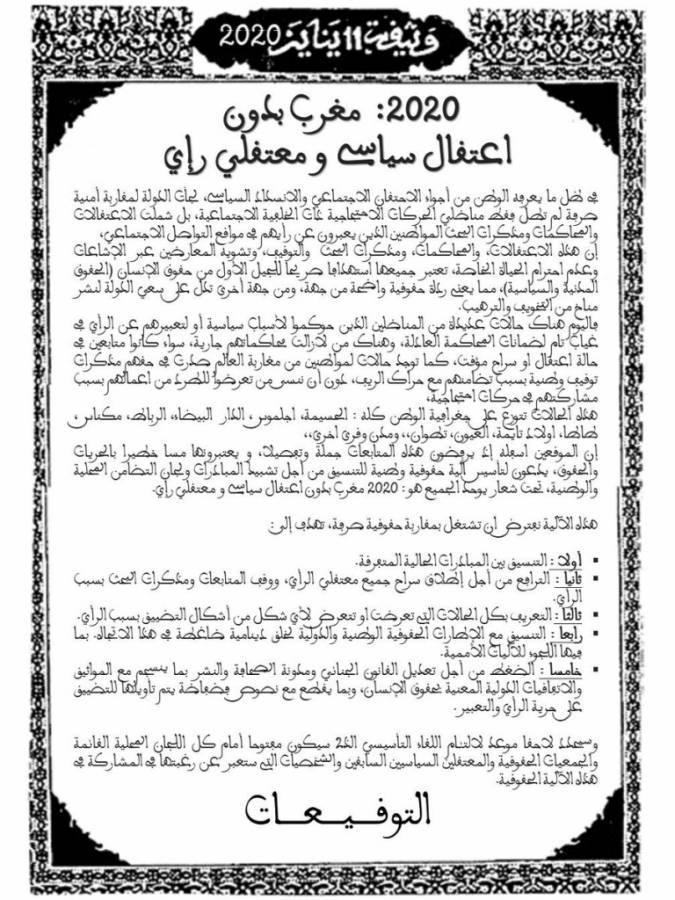
Yet, in the famous words of poet Abū Tayyib Al-Mutanabbī, it seems like sometimes “the wind blows against ships’ sails (things don’t always go according to plan).” In the year 2020, authorities did not desist/cease from detaining individuals known for their critical writings expressing anti-government sentiment. The crackdown culminated in the arrest of prominent historian and activist – and one of the signees of the aforementioned document – Maâti Monjib on the 29th of this past December.
Moroccan authorities placed human rights activist Maâti Monjib in pre-trial detention just months after launching a preliminary investigation into Monjib and members of his family on suspicion of alleged ‘money laundering’. The move was heavily denounced by politicians and activists both within and outside Morocco, blasting the allegation as a “fabricated accusation” by the state to suppress Monjib’s activism and critical stances.
The arrest was not the only blow to oppositional voices in 2020. The rights of Moroccan citizens were effectively violated on two accounts: their right to express themselves via “freedom of speech” and their right to “privacy” to withhold their opinions.
Today, the question remains: What will the situation be like in 2021?
Arrest With No Trial
Suleiman Raissouni is a prominent Moroccan journalist and the editor-in-chief of the daily Moroccan newspaper ‘al-Akhbar al-Yawm’, where he became known for his sharp, analytic openings and unabashed critique of government policies.
Security forces arrested him on May 22nd under allegations of “indecent assault with violence and detention” against a gay man. His detention continues to this day despite several demands by his defense team that he be released with guarantees to stand trial. Moreover, the allegations, which came based on a Facebook post by someone who has not revealed his true identity, were never corroborated or proven.
It seems that through repeated incidents and experiences, according to journalist and member of Suleiman’s solidarity committee Hajar Raissouni, “the top reason for placing him in detention, as well as preventing him from preparing his defense and standing trial, is to silence a pestering and critical voice that puts his finger on the wound and is capable of calling things out as they are.”
To Raseef22, Hajar states that the tactic is a loud message to anyone that considers writing or expressing an opinion that reads, “we are above the law, and we can hold you for months, years even, with no legal justification.” She adds, “Unfortunately, security forces are deeply infiltrated in most state institutions and control many of their operations.”
Moreover, the independent journalist believes “the worst is yet to come.” Referring to the state’s mistreatment of Suleiman and its disregard for legal proceedings from the very beginning, she adds, “From the first minute of his arrest, no legal agenda or commitment to fair trial was honored.”
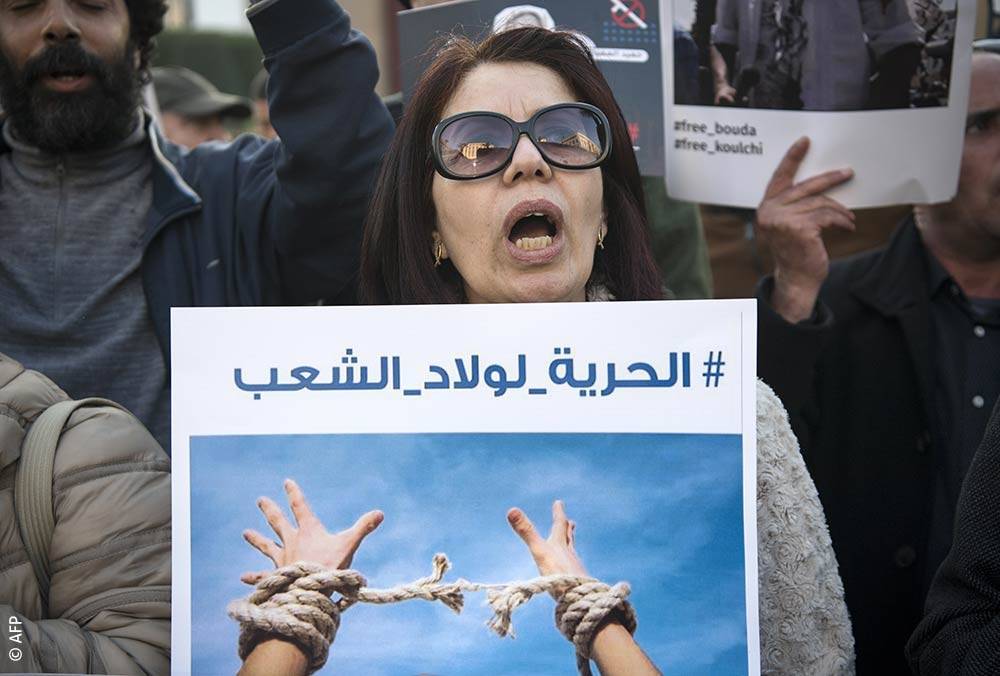
Nonetheless, Hajar is holding on to hope. She is looking forward to a time when courts replace the anarchy “we’re living, when the rule of law takes hold, and the public prosecution’s office lifts its hand off the case.” She adds that Suleiman’s friends and family, as well as his colleagues and a wide variety of politicians and rights advocates, are adamant about his innocence and consider his detention “repressive” and “politically motivated.”
Several rights groups, including NGOs for the advocacy of “individual liberties,” denounced what it perceived as the state’s “exploitation” of “gender minorities” and the manipulation of cases of violence against women to settle political scores and get back at Raissouni.
If prison bars are made out of steel, it seems the slander campaigns targeting opposition figures and rights advocates in Morocco are bars of silk that incapacitate the target or strangle him/her metaphorically
Moreover, a feminist rights collective named ‘Khmissa’ slammed the “exploitation of women’s issues and wrongfully using them to settle political scores,” indicating that this “will further afflict feminist work and help reinforce negative stereotypes against women – effectively racking up violence against them in the end.”
Worth mentioning, a week following the arrest of Suleiman Raissouni, a female Facebook user announced that she had been contacted by the alleged victim’s attorney to testify to being another victim of Raissouni.
She wrote, “I don’t know what’s being cooked up, but I can say: I have no connection whatsoever to [Raissouni], and I was never harassed by him.”
A Journalist Spy!
Suleiman isn’t the only one imprisoned under “assault” charges. Investigative journalist Omar Radi has also been detained since the 29th of July under allegations of “rape” of which he says was consensual between him and a coworker.
The main part of Omar Radi’s case began late June, following the release of a report by Amnesty International accusing Moroccan authorities of spying on Radi’s phone using the Israeli “Pegasus” program. The public prosecution then began investigating Radi for “receiving foreign funding,” “undermining the external security of the state” and “having connections with foreign spies to harm Morocco’s diplomatic milieu” - without naming the country in question.
In this regard, Miloud Kandil, Radi’s lawyer, says accusing Omar of “treason and espionage” lacks valid evidence, especially since the public prosecutor has yet to prove the occurrence of malfeasance or foul play that can be construed as a threat to national security.”
Therefore, and in light of the absence of actual harm, Kandil tells Raseef22, “we cannot describe Omar Radi’s arrest as anything but ‘repressive’ and a violation of freedom of speech and the internationally recognized right to practicing free press.” Furthermore, he indicates that accusing Radi of spying for his foreign contacts is an “intrusion into the essence of his journalistic work.”
It is noteworthy that the same journalist was previously charged with “contempt to the judiciary system” and given a suspended sentence of four months in prison in March. The charges were levelled against Radi on the grounds of a tweet he had posted, slamming the court’s decision in the cases of detainees of the Hirak Rif Movement.
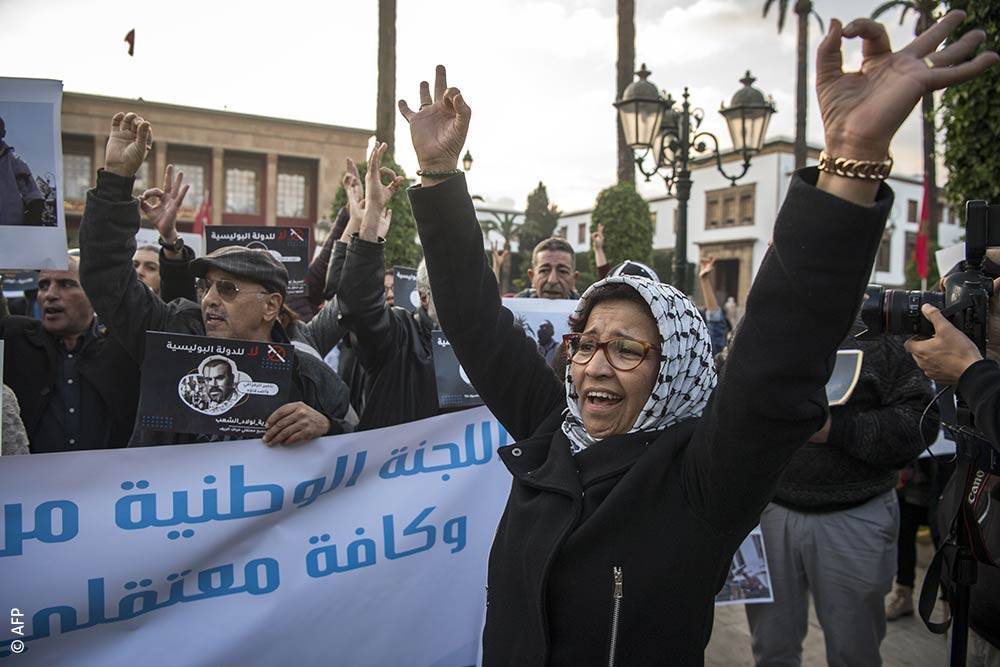
Tightening The Noose Around Oppositional Voices
Omar Radi is one of eight political activists and rights advocates - half of which are members of the oppositional Justice and Charity Party (‘Al Adl wal Ihsane’) - to announce that their phones have been hacked and surveilled by the authorities via the “Pegasus” program that the Israeli group NSO sells to government agencies and security firms.
State security agencies have grown more intrusive and do not take into account the bare minimum of Morocco’s commitments to bascic human rights… Moroccan activists are sounding the alarm for the human rights scene in 2021
Last July, several activists, including Maâti Monjib, issued a joint statement denouncing what they call “the Moroccan authorities’ attempt to weasel out of its responsibilities and spying on a group of oppositional figures in a blatant violation of their basic rights.”
The activists mentioned that they were previously informed by the WhatsApp application in November of 2019 that their phones had been hacked “with the intent of spying and violating their right to privacy.” This information coincided with the publication of a report by Amnesty International that revealed “several state authorities, including that of Morocco, used the Pegasus program to spy on its dissidents” -- a statement the Moroccan government denies.
“We refuse the intrusion into our personal lives and having our every movement monitored and surveilled extrajudicially,” says Hassan Benajeh, member of the general secretariat for the ‘Al Adl wal Ihsane’ group. Benajeh adds that such operations require a court order and strict legal supervision that safeguards the private data of every citizen.
Speaking to Raseef22, he notes that the violations do not stop at security surveillance and breaching citizen privacy but surpass it. Personal information “finds its way to tabloids and yellow pages to become fuel for slander and defamation campaigns.” Even more sinister is how “targeting their privacy extends to their relatives and those surrounding them."
Defamation… Chains of Silk
Dissenters who choose to tweet against the grain and critique the oligarchy’s policies live in constant fear of becoming the target of smear campaigns. Some media outlets receive parcels of information on individuals to besmirch and expose the details of their everyday lives.
To Raseef22, Hicham (alias) says, “I no longer dare to critique any state official or authority, because of all the personal information I’m coming across on some media outlets and online platforms,” adding, “I fear they would target my family.”
If prison bars are made out of steel, it would seem that the slander campaigns targeting opposition figures and rights advocates in Morocco are bars of silk that either incapacitate the target or strangle him/her metaphorically.
For his part, lead figure in the ‘Al Adl wal Ihsane’ party Hassan Benajeh is not surprised by such ploys. “In the presence of an undemocratic system that precludes accountability and lacks an independent judiciary,” he says, and the same applies to “tactics like espionage, political detentions, the absence of conditions for a fair trial, and the lack of respect for the presumption of innocence."
What Will 2021 Hold?
Rights activist Khadija Riyadi expects to witness a rise in rights and liberties violations in Morocco this year. Analyzing the events of the last few months of the past year, she states, “state security agencies have grown more intrusive and do not take into account the bare minimum of Morocco’s commitments within the field of human rights.”
She mentions the appearance of several markers indicating the situation’s decline in the new year, including “decisions made by the state on multiple levels, most notably the Finance Law, and both the Labor and Strike Laws.” This all comes in addition to the normalization of its relations with Israel, which would put it in “a confrontation with the Moroccan people that began at the end of last year with the suppression of demonstrators against the decision.”
To this extent, journalist Hajar Raissouni says, “with the arrest of historian Maâti Monjib, I lost the last strands of hope for change I had been holding on to only a few days before.” According to her, Morocco is “experiencing regress on all aspects and a decline in all rights and liberties,” including but not limited to the rights to free speech, free press, and to organize and protest.”
Hajar adds, “fear struck everyone, and no political figures or rights advocates are saying anything,” anticipating disaster if things continue as is.
The same position is shared by Miloud Kandil, head of the Moroccan Association for Human Rights. According to Kandil, the arrest of Maâti Monjib, Omar Radi, and Suleiman Raissouni is an “ominous indicator that signifies 2021 will be a year for further violating and trampling on human rights in Morocco.” Yet, he hopes that “Moroccan authorities might come to their senses,” stop the affair of political detention, and allocate more space for freedom of speech and expression.
For his part, leading figure of the ‘Al Adl wal Ihsane’ party Hassan Benajeh says, “the tyranny of the state will erode its core and strengthen both opposition and the civil body,” indicating that “suppression breeds public disobedience and raises awareness of the imperative for a truly democratic society.”
Moreover, Benajeh believes that countries “built on suppressing freedom of speech cannot persist for a long period of time.”
Benajeh and Riyadi both agree that the solution is riding on the resilience and endurance of progressive movements as a “counterforce”. In this regard, Khadija Riyadi maintains that “these movements stand against policies that violate human rights,” reiterating the need for rights advocates and political elites to organize and buckle down for shared work.
Morocco won its independence from France 7 years after the official document calling for an end to the occupation was signed by Moroccan elites. Similarly, Moroccan activists have penned their own declaration of freedom in 2020. So will their demand for a democratic Moroccan state free of political detention be granted in 2021? A year later? Or perhaps 7 years after signing the latest January 11th document?
Raseef22 is a not for profit entity. Our focus is on quality journalism. Every contribution to the NasRaseef membership goes directly towards journalism production. We stand independent, not accepting corporate sponsorships, sponsored content or political funding.
Support our mission to keep Raseef22 available to all readers by clicking here!
Interested in writing with us? Check our pitch process here!
